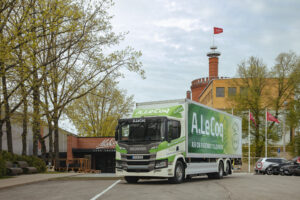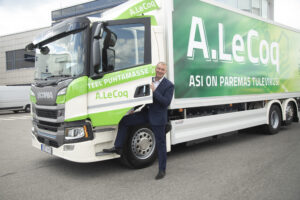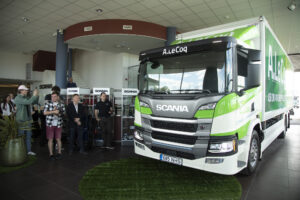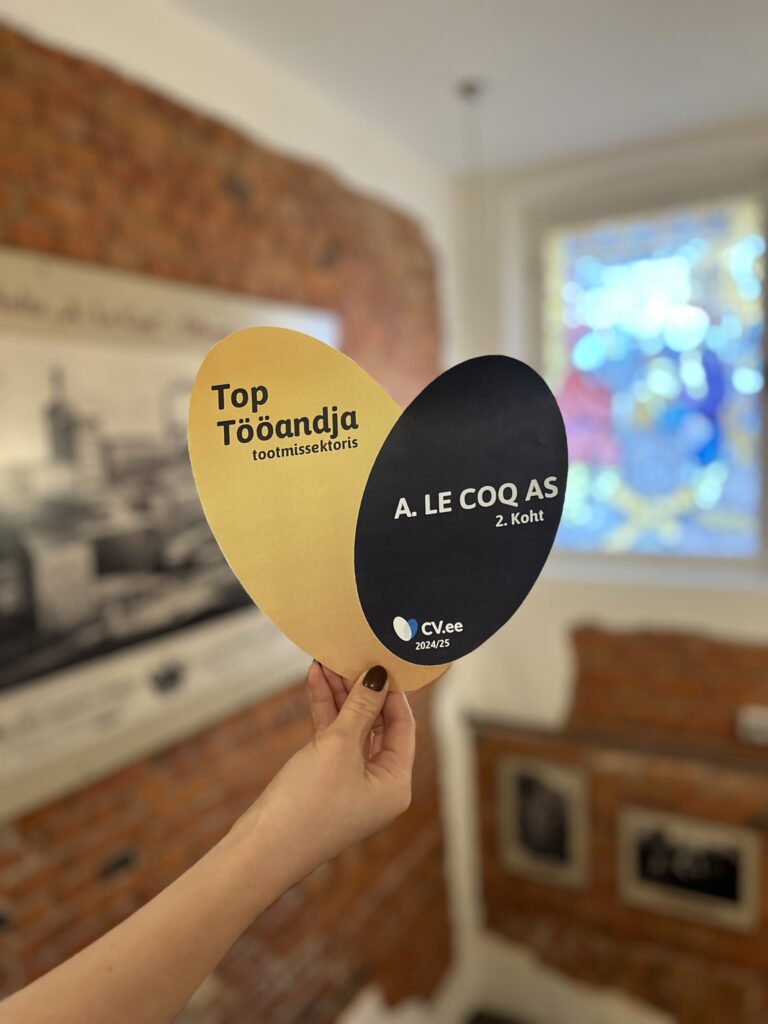

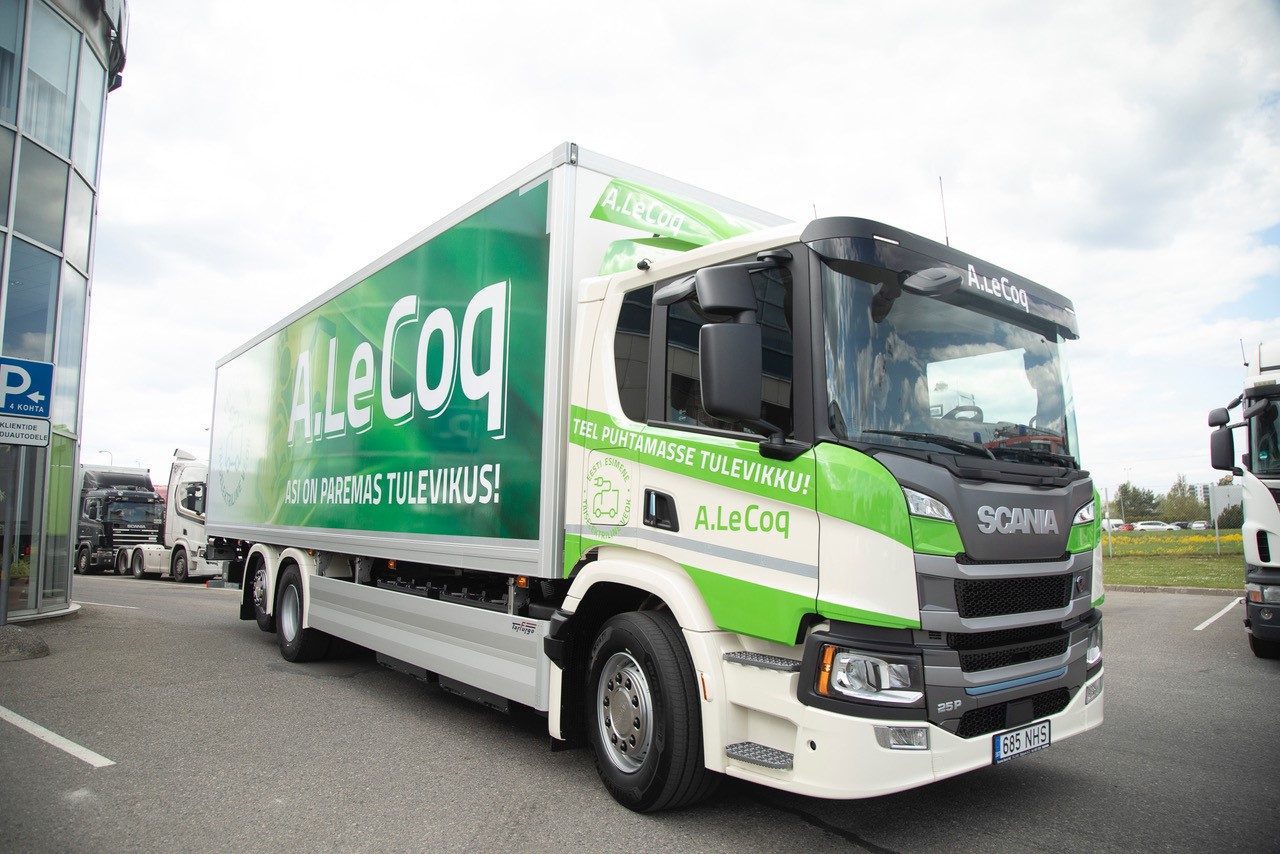
On May 25th, the first fully electric heavy-duty truck in the Baltics was unveiled at Scania’s Tallinn dealership. The truck will be used to transport goods for A. Le Coq, Estonia’s largest beverage producer. The new vehicle is capable of traveling up to 250 kilometers on a single charge with a full load of 14 tons. Compared to a diesel truck, the electric vehicle has a (well-to-wheel) carbon footprint up to 99% smaller.
According to Janno Karu, the Head of Scania Estonia, this is the first electric truck to hit the roads in Estonia, but more are expected in the coming years. Scania aims to have 10% of its new vehicles sold in Europe be electric trucks by 2025, and by 2030, half of all new trucks should be fully electric. “These targets are directly related to the goals of the Paris Climate Agreement. In order to mitigate the impact of global climate change, we need to reduce our CO₂ footprint by 50% every decade, and one solution is to electrify our fleet,” said Karu. He added that Scania became the world’s first heavy-duty vehicle manufacturer in 2020 to set science-based targets to reduce greenhouse gas emissions from its business operations and products.
Karu noted that there are three main obstacles to achieving a mass transition to green solutions in the transport sector. “The price of an electric truck is nearly double of a diesel truck, which is beyond the reach of many transportation service providers. Additionally, there is currently a lack of sufficient charging infrastructure and capacities on the roads, and thirdly, there is a need to significantly increase the share of renewable green electricity. Addressing these three aspects will undoubtedly require support from national and European Union structures,” explained Karu.
He added that the environmental advantages of an electric truck over a diesel truck are most evident when the vehicle is charged with renewable green electricity, resulting in a wheel-to-wheel carbon footprint up to 99% smaller compared to a diesel truck.”
Estonia’s green transition leader, Kristi Klaas, stated that the transport sector accounts for approximately 17% of greenhouse gas emissions. “Reducing emissions in the transport sector is a significant challenge for both the European Union as a whole and Estonia because by 2030, we must reduce emissions in the transport and agriculture sectors by 13%, which is likely to increase to 24% after the negotiations on the new climate package,” said Klaas.
She added that these goals can be achieved through three components: the public sector setting an example by procuring environmentally friendly vehicles, supporting the adoption of more sustainable vehicles through infrastructure development, and private sector interest and initiatives. “Starting this summer, the public sector and state-owned enterprises will only procure environmentally friendly buses, trucks, and cars. Additionally, there is a major challenge in providing suitable charging infrastructure, and negotiations are underway in the European Union to determine the required capacity and spacing of charging infrastructure across Europe. Private sector initiatives are also highly anticipated because environmentally conscious companies are often pioneers in testing new technologies and solutions, thus leading the way for other businesses,” said Klaas.
Tarmo Noop, the CEO of A. Le Coq, stated that this is the first truck the company has acquired as they usually outsource transportation services. “Typical transportation service providers cannot afford to purchase electric trucks due to their high cost, which is why the willingness of customers to make transportation greener is crucial in promoting sustainable transport. Our intention is clear, which is why we purchased the truck and provided it to our logistics partner. It aligns with A. Le Coq’s goals of leaving a cleaner and better world for future generations,” said Noop.
Noop continued by explaining that while the purchase cost of an electric truck is twice as high compared to a diesel truck, its advantages lie in energy efficiency and fuel costs. “The price of fossil fuel inevitably continues to rise, but the more renewable electricity is produced, the more cost-effective the electric truck becomes per kilometer. Currently, the cost of electricity per kilometer is one-third cheaper than the price of diesel fuel,” clarified Noop. A. Le Coq’s electric truck (like the entire company) runs solely on renewable green electricity.
Noop encourages other companies to take similar steps and continuously seek opportunities to reduce their carbon footprint. “The private sector must lead, and then policies and decisions will follow,” stated Noop.
A. Le Coq’s electric truck will transport goods in Tallinn. As it lacks an internal combustion engine and exhaust pipe, it reduces both noise and exhaust emissions in the city, ensuring cleaner urban air.
Electric truck specifications:
Length: 11.5 m
Wheelbase: 5.75/1.35 m
Electricity consumption per kilometer: ~1.3 kWh/km
Payload: 14,060 kg
Range: up to 250 km
Motor power: 230 kW
Additional features: box body with rear liftgate
Total weight of the truck: 29 t
Battery capacity: 300 kWh
